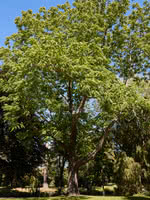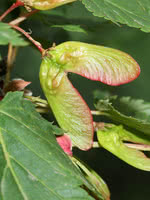Mon-Fri 9am - 5pm Mountain time
Black Walnut vs Douglas Maple
Juglans nigra
Acer glabrum
NOT AVAILABLE THIS SEASON - MIGHT RETURN
CUSTOM GROW
The Black Walnut is a slow growing, large, straight-stemmed tree with an open crown. It produces dense, very hard, edible nuts.
Black Walnut has a deeply-furrowed, black bark. Its leaves are about 1 foot long, composed of 15 - 23 slightly stalked leaflets on a moderately stout stock which provide good dappled shade.
Despite being highly valued for its edible nuts and its shade tree aesthetics, it is rare to see this tree on the prairies.
Note: Black Walnut's roots produce a substance named juglone that is toxic to some other plants. Consider this when choosing where you plant a black walnut, as you will not be able to grow tomato, potato, cabbage, eggplant, blueberry, azalea, rhododendron, lilac, red pine and apple in the surrounding area.
Note: Plant this tree once. It will not respond well to transplanting.
Note: Although self-pollinating, planting two trees significantly improves nut production.
A top CO2 absorbing species. Experts think this tree may help climate change more than others.
Douglas Maple is a fast growing, long lived, ornamental tree. It can take on a shrubby or multi-stemmed form with densely packed leaves, making it an excellent tree for privacy screens and hedges.
In the fall, the leaves make a brilliant change to red, orange, or yellow depending on the tree and its sun exposure. Douglas Maple's compact size makes it ideal for planting in urban yards and under power lines.

